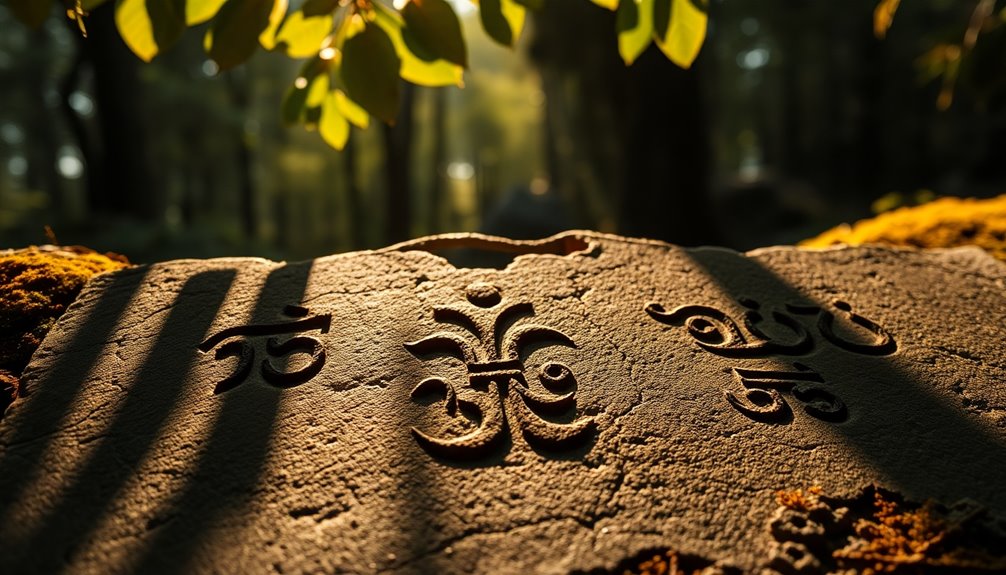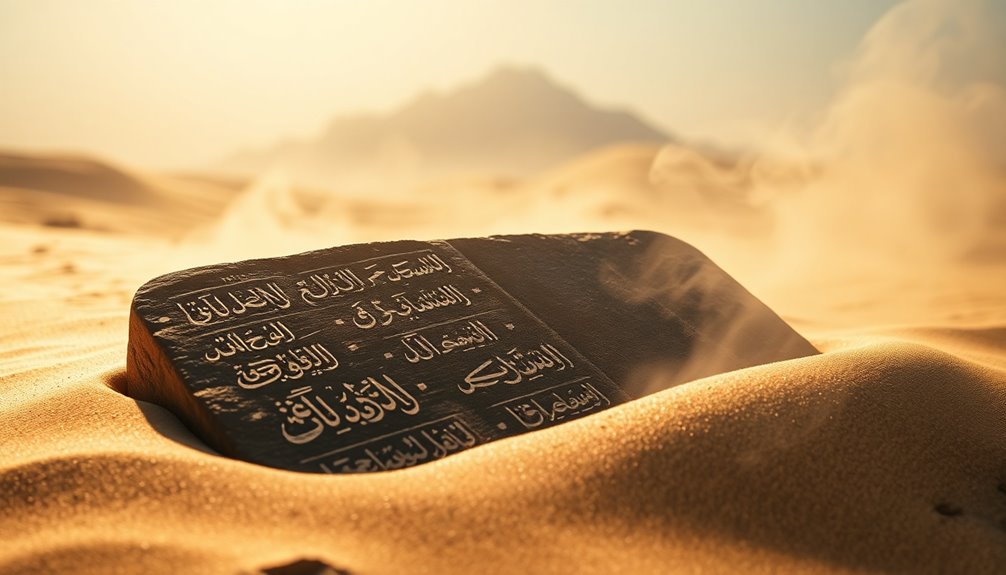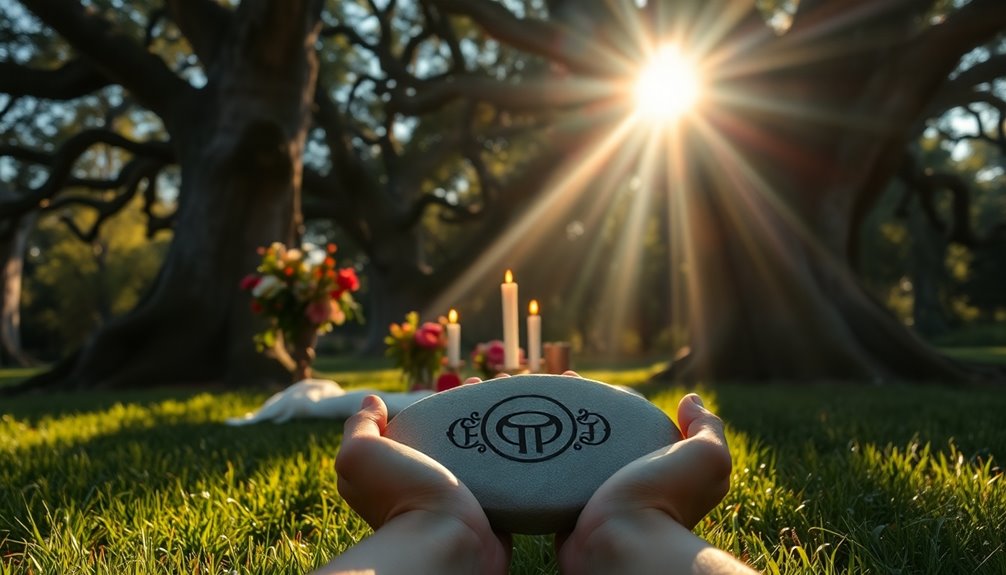Unlocking the mysteries of God's hidden names reveals powerful insights into His character and authority. Each name, like Jehovah Jireh and Jehovah Rapha, highlights different aspects of His essence—provision and healing. By understanding these divine names, you deepen your relationship with God and tap into His promises. It's not just about knowing them; it's about how they enhance your spiritual journey and strengthen your prayers. Misinterpretations can limit your understanding, but with clarity, you can embrace the fullness of God's nature. There's so much more to uncover about these names and their significance in your life.
Key Takeaways
- Divine names reveal God's character and attributes, enhancing believers' understanding of His essence and nature.
- Names like Jehovah Jireh and Jehovah Rapha illustrate God's provision and healing, extending beyond superficial interpretations.
- Misinterpretations can obscure the richness of God's involvement, such as viewing "Elohim" merely as plural rather than reflecting divine unity.
- Daily meditation and prayer focused on God's names foster a deeper spiritual connection and alignment with His promises.
- Resources like scholarly texts and community study groups provide valuable insights into the significance and relevance of divine names in faith.
Introduction

Throughout history, the names of God have served as powerful reflections of His character and attributes. When you explore names like Elohim and El Shaddai, you uncover insights into God Almighty's nature and His relationship with humanity. Each name reveals different aspects of His essence—His authority in creation, His sovereignty, provision, healing, and eternal presence.
For instance, consider Jehovah Jireh, which emphasizes God as your provider, and Jehovah Rapha, highlighting His role as your healer. These names illustrate God's intimate involvement in your life and the world around you.
When you invoke these divine names in prayer, you align yourself with His authority and power, finding comfort and strength in times of challenge.
Understanding these hidden names deepens your spiritual growth and enriches your relationship with God. By recognizing His multifaceted identity, you can cultivate a more profound connection with the Holy Spirit.
As you delve into the significance of these names, you'll discover how they can transform your understanding and experience of God's presence in your life.
Divine Names in Scripture

When you explore the divine names in Scripture, you'll discover how each one reveals a unique aspect of God's character.
From Elohim in Genesis to Jehovah Shammah in Ezekiel, these names highlight God's authority, provision, and presence.
Understanding these references will deepen your appreciation of His nature and promises.
Primary Bible References
In the rich tapestry of Scripture, divine names reveal profound insights about God's character and His relationship with humanity. The name Elohim, found in Genesis 1:1, signifies God's authority and power in creation. This name hints at the divine unity and the concept of the Trinity, illustrating that God is both powerful and relational.
Another significant name is Jehovah Jireh, introduced in Genesis 22:14. This name means "The Lord will provide," showcasing God's unwavering provision during times of need, especially in the context of Abraham's faith test. It reassures you that even in dire situations, God meets your needs.
Additionally, Jehovah Rapha, revealed in Exodus 15:26, emphasizes God's role as a healer. It encompasses all aspects of restoration—physical, emotional, spiritual, and national—reminding you that God cares for your wholeness.
These names not only define God's attributes but also strengthen your understanding of His commitment to you. By recognizing these divine names, you deepen your relationship with God and appreciate the multifaceted ways He interacts with humanity.
Secondary Bible References
Understanding the divine names in Scripture extends beyond the primary references; secondary Bible references further illuminate God's character and His interactions with humanity.
For instance, the name El Elyon, which means "God most high," appears in Genesis 14:18-20, emphasizing His supreme authority over everything. This name reassures you that no matter your circumstances, God reigns above all.
Another important name is Everlasting God, found in Isaiah 40:28, which highlights God's eternal nature and His unwavering presence throughout your life. This title brings comfort, reminding you that He's timeless and unchanging, even in a world full of uncertainties.
Additionally, the name Jehovah Rapha, or "God Who heals," is revealed in Exodus 15:26. This powerful name assures you that God is always ready to bring healing and restoration, whether it's physical, emotional, or spiritual.
When you face challenges, remembering these secondary references can deepen your understanding of God's multifaceted nature and His compassionate involvement in your life. Embracing these names helps you connect more intimately with His divine essence and purpose.
Ancient Near Eastern Beliefs

Ancient Near Eastern beliefs revolve around a rich tapestry of deities that embody various aspects of nature and human life, from fertility to warfare. In these societies, the concept of divine sovereignty was crucial. You'd find multiple gods, like Marduk, viewed as powerful rulers who maintained cosmic order. Each deity had specific attributes, and rituals were performed to appease them, ensuring favor and protection from calamities.
God reveals Himself through these interactions, as communities sought to understand their place in the universe. The names of these gods often reflected their functions, much like the names of God in the Hebrew Bible, revealing His character and roles such as creation and healing.
Mythological narratives, such as the Enuma Elish, explain creation and illustrate the relationship between gods and humanity. These stories not only shaped religious practices but also influenced later texts.
While these ancient beliefs centered on multiple gods, the transition to the worship of one God marked a significant shift in understanding the divine. This evolution paved the way for deeper theological insights that continue to resonate today.
Symbolism of Divine Names

The names of God carry profound symbolism that reveals His character and attributes, much like the deities of the Ancient Near East. Each name encapsulates specific aspects of who He's and how He interacts with the world.
For instance, when God said, "I am Jehovah Jireh," He signifies His role as the Provider, ensuring our needs are met. Similarly, the name El Shaddai, or almighty God, underscores His limitless power, demonstrating that no situation is beyond His control.
In times of chaos, you can find refuge in Jehovah Shalom, meaning "The Lord is peace." This name assures you that even amidst life's storms, God offers tranquility.
The name Elohim emphasizes God's authority in creation, affirming both His power and the unity of His nature, hinting at the Trinity.
Moreover, the phrase "God With Us" symbolizes how God desires a close relationship with humanity, providing comfort and guidance.
Each divine name serves as a window into His essence, allowing you to better understand and rely on His attributes in your daily life. Embracing these names can deepen your faith and enhance your spiritual journey.
Misunderstandings About Divine Names

When it comes to the names of God, many people hold misconceptions that can distort their understanding.
You might think these names are just titles or magical formulas, but they actually reveal deeper truths about God's character and relationship with us.
Let's explore how cultural interpretations can lead to misunderstandings and what these names truly signify.
Dispelling Common Misconceptions
While many people think the names of God are interchangeable, each one actually reveals a distinct aspect of His character and relationship with humanity. For instance, when God calls Himself "El Shaddai," He's not just declaring His might; He's highlighting His nurturing and sustaining nature as a provider and protector. This name assures you that the Lord your God is intimately involved in your life, meeting your needs both spiritually and materially.
Some might mistakenly view the plural form "Elohim" as a sign of multiple gods, but it reflects the complexity and unity of the one true God, hinting at the Trinity.
Additionally, the name "Jehovah Rapha" is often thought to refer only to physical healing. However, it encompasses emotional and spiritual restoration, showcasing God's holistic approach to healing.
Another common misconception is that these names are merely historical or cultural. In reality, they serve as powerful tools for prayer and spiritual warfare, aligning you with divine authority.
Understanding these names enriches your relationship with God and deepens your faith journey.
Cultural Misinterpretations of Names
Cultural interpretations of God's names often lead to significant misunderstandings that can distort their intended meanings. For instance, many people view "Elohim" simply as a plural term, missing its profound implication of divine unity within the Trinity. This oversight can limit your understanding of God's nature.
Similarly, "Jehovah Jireh," which translates to "The Lord Will Provide," is often misconstrued to imply only financial support. In reality, it encompasses broader divine intervention during desperate times, showing that God provides in various ways beyond material needs.
When it comes to "Jehovah Rapha," many interpret it solely as a promise of physical healing. However, this name also signifies emotional and spiritual restoration, emphasizing the holistic care God offers to His people.
Additionally, names like "El Shaddai" are often seen as mere titles of might, neglecting their deeper significance as representations of God's nurturing and protective nature.
Finally, "Jehovah Shalom," meaning "The Lord is Peace," is sometimes misunderstood as the absence of conflict, rather than recognizing the profound inner peace God provides amid life's challenges. Understanding these names in their full context enriches your spiritual journey.
Everyday Spiritual Practices

Incorporating daily meditation on the names of God can transform your spiritual routine, allowing you to connect more deeply with His attributes.
Joining group prayer sessions centered around these names not only enriches your faith but also fosters community support and shared experiences.
Daily Meditation on Names
Meditating on the names of God can transform your daily spiritual practice and deepen your connection with the divine. By focusing on names like Elohim and El Shaddai, you gain insight into His attributes, fostering a richer understanding of who He is.
Engage in reflective prayer using Jehovah Jireh for provision or Jehovah Rapha for healing, aligning your spiritual needs with God's promises.
Incorporating these names into daily affirmations serves as a powerful reminder of His presence and authority. When you meditate on Jehovah Shalom, you invite inner peace during times of stress and chaos.
Setting aside time to study names like Jehovah Sabaoth inspires confidence in the power of God over your challenges and spiritual battles.
Remember that these names reflect the character of Jesus Christ, who embodies the fulfillment of God's promises. As you meditate, visualize how the Lord God operates in your life, allowing His names to resonate within your heart.
Such daily practices not only uplift your spirit but also cultivate a profound sense of connection with the divine, enriching your spiritual journey every day. Embrace this transformative experience and watch your faith flourish.
Group Prayer Sessions
Group prayer sessions can significantly enhance your spiritual journey by fostering a deeper connection with God and each other. When you gather with others to invoke the names of God—like Jehovah Jireh for provision or Jehovah Rapha for healing—you create a powerful communal atmosphere of faith and support.
Each name you call upon reminds us of God's attributes and how He became flesh to walk among us. Encouraging participants to share personal testimonies about their experiences with these names can strengthen your bonds and inspire collective faith.
When you focus on names like Jehovah Shalom for peace, you help everyone find solace and unity during challenging times. Structured prayers that center around these names guide you in understanding their significance, making your sessions more impactful.
As you engage in group prayer, you'll find that the act not only enriches your connection with God but also unites you with your community, both in heaven and on Earth. Embracing this practice nurtures a consistent spiritual routine and deepens your understanding of who God is, allowing you to experience His presence in profound ways.
Divine Names Enhance Spiritual Connection

When you embrace the divine names of God, such as Elohim and El Shaddai, you unlock a deeper understanding of His infinite attributes. These names reveal aspects of God's character, helping you connect with His purpose in your life.
For instance, invoking Jehovah Jireh during prayer aligns you with His provision, while Jehovah Rapha reminds you of His healing power. Understanding names like Emmanuel, meaning "God With Us," reinforces the intimate relationship you can have with God, especially during trials.
When chaos surrounds you, remembering Jehovah Shalom brings comfort, affirming that peace is available amidst turmoil. As you meditate on these divine names, you'll find your spirit more attuned to God's presence.
Moreover, using Jehovah Sabaoth highlights God's authority over all matters, enhancing your spiritual warfare and intercessory prayers. These divine names create a sacred atmosphere where God would live within your heart, fostering a profound connection.
Additional Resources

To deepen your understanding of the divine names of God, exploring additional resources can significantly enhance your spiritual journey. Start by diving into comprehensive studies that analyze the names of God in biblical texts, focusing on their meanings and implications. This approach gives us clarity about God's character and attributes, revealing how these names shape our faith.
Utilize online resources like articles, videos, and podcasts, which delve into specific names such as Jehovah Jireh and El Shaddai. These tools illustrate their relevance in modern faith practices. Scholarly books can also provide theological insights and context, helping you grasp the significance of God's names throughout Scripture.
Engage with community groups or church study sessions that discuss the names of God. This collective learning fosters personal reflections on how these names, like the God who sees, impact your prayer and worship life.
Finally, access devotional materials that encourage daily meditation on these names. By incorporating them into your personal faith journey, you'll find a deeper connection with the beginning God, enriching your relationship with Him.
Frequently Asked Questions
How Is the Mystery of God Revealed?
The mystery of God's nature is revealed through His names, each showcasing different facets of His character.
When you explore names like Elohim and El Shaddai, you grasp His authority and power. As you reflect on Jehovah Jireh, you see His provision during tough times.
Names like Jehovah Shammah remind you that He's always present. Each name offers insight, helping you understand His essence and deepening your relationship with Him.
What Is the Hidden God and the Revealed God?
The Hidden God represents the aspects of His nature that remain mysterious and beyond your understanding. You might feel His sovereignty and transcendence in your life, even when you can't fully grasp His ways.
Conversely, the Revealed God shows you His accessible attributes, like love and mercy, through scripture.
This contrast invites you to trust in His plan, deepening your relationship with Him as you seek guidance and comfort during life's challenges.
What Are the Seven Secrets Names of God?
The seven secret names of God reveal His unique characteristics and purposes.
You've got Elohim, signifying His creative authority; El Shaddai, showcasing His limitless power; Jehovah Jireh, representing His provision; Jehovah Rapha, assuring healing; Jehovah Nissi, symbolizing victory; Jehovah Shalom, embodying peace; and Jehovah Sabaoth, emphasizing His sovereignty over all.
Each name reflects a different aspect of God's nature, offering you insights into His relationship with humanity and His divine plan.
How Do I Access the Secret of the Lord?
To access the secret of the Lord, you need to cultivate a personal relationship with Him.
Start by engaging in prayer and meditative study, focusing on His names. Reflecting on names like Jehovah Jireh or Elohim can deepen your understanding of His provision and power.
The Holy Spirit will guide you, revealing God's character and attributes. Embrace His sovereignty through names like El Elyon, allowing trust and spiritual insights to flourish in your life.










